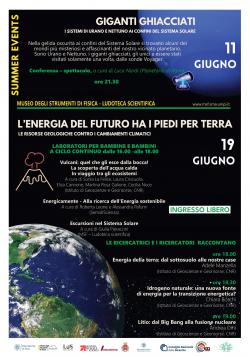
Summer is approaching and the Museum of Physical Instruments - Ludoteca Scientifica, in collaboration with the Institute of Geosciences and Georesources - National Research Council, Planetarium of Rome and SemidiScienza, has a rich calendar of events consisting of conferences, debates and workshops for children with free admission that will enrich the events of Giugno Pisano.
11 June, 9.30 p.m. – Conference-show
ICY GIANTS - URANUS AND NEPTUNE SYSTEMS ON THE EDGE OF THE SOLAR SYSTEM by Luca Nardi (Planetarium of Rome)
In the icy darkness at the edge of the Solar System lie some of the most mysterious and fascinating worlds in our planetary neighborhood. They are Uranus and Neptune, the frozen giants, the only ones to have been visited only once, by the Voyager probes.
It then continues on June 19 with:
ENERGY OF THE FUTURE HAS FEET FOR THE GROUND- Geological resources against climate change
- from 4 to 6 p.m. – Workshops for girls and boys in continuous cycle (Age: 6+)
Volcanoes: what comes out of his mouth! Every volcano has its own character! There is the calm guy and the most angry one and from their mouth different products are erupted: bombs, lavas, lapilli.. Shall we blow a volcano together?
The discovery of hot water. Playing together we will discover how fluids in the subsoil are heated and how we can use them, not only energy but also much more!
Traveling through ecosystems. Through games and experiments we will explore different ecosystems, will help us in this trip a special Museum that will transport us to different environments by making us discover them closely.
edited by Sonia La Felice, Laura Criscuolo, Elisa Cannone, Martina Galione, Cecilia Noce (Institute of Geosciences and Georesources, National Research Council)
Energicamente - Alla ricerca dell'Energia sostenibile curated by Roberta Leone and Alessandra Pafumi (SemidiScienza)
The energy that we use every day in our homes and at school, the energy that comes from the sun and that can be produced by the wind, water and sea. Energy that is not renewed: oil and natural gas. Do all people have access to energy? Do we consume too much of it? We will discover the importance of this fundamental resource for our lives.
Excursions in the Solar System by Giulia Pieraccini (Museo degli Strumenti di Fisica - Ludoteca scientifica)
Exploring various celestial bodies of the solar system with 3D models you will learn to observe the shapes of the landscape that tell what events have acted and modeled their surfaces. It will be discovered that similar phenomena in different environments can lead to the same forms, it will be understood if a planet has an active geology and if there is or has been water on its surface.
from 6 p.m. – The researchers tell
6 p.m. – Energy of the earth: from underground to our homes
Adele Manzella (Institute of Geosciences and Georesources, National Research Council)
Geothermal energy: a resource of earth and fire, steam and air, which man has been able to use to produce heat, electricity and much more. We will explore together the amazing applications of geothermal energy in Tuscany and how the use of Earth heat is developing.
6.30 p.m. – Natural hydrogen: a new energy source for the energy transition?
Chiara Boschi (Institute of Geosciences and Georesources, National Research Council)
Natural hydrogen, also known as native or geological hydrogen, is an energy source that could revolutionize our low-carbon future. Although in the past its energy potential has been neglected - because it was considered too rare or difficult to extract - recently numerous natural leaks of H2 have been reported, many of them accidentally discovered. This meeting will be an opportunity to learn about the potential of the use of natural hydrogen for the energy transition and research on hydrogen in Italy.
7 p.m. – Lithium: from the Big Bang to nuclear fusion
Andrea Dini (Institute of Geosciences and Georesources, National Research Council)
Lithium, the lightest metal of the periodic table and the one with the highest electrochemical potential, perfect for producing light and high energy density batteries. The Intergovernmental Panel on Climate Change tells us that in order to combat climate change we must decarbonise our society as soon as possible by replacing fossil energy sources with low CO2 emissions and electrifying human mobility. All this will also depend on the ability to store the energy produced that, for many years to come, will happen thanks to lithium batteries. It will be necessary to find new deposits of lithium. Unconventional resources that, thanks to technological innovations, can be used to extract metal in an economic and above all sustainable way. It will be up to us to choose whether to study and use them responsibly and sustainably or whether to buy lithium on the market - if it is available - without worrying about how and where it was produced. Lithium, however, is also much more, lithium opens a window on the space-time depths of the Cosmos and also makes us reflect on an energy future based on nuclear fusion.
All events are accessible to people with disabilities and do not require reservation.
For further information: email: ludotecascientifica@gmail.com - Tel. 320 0403946/ 050 2214861